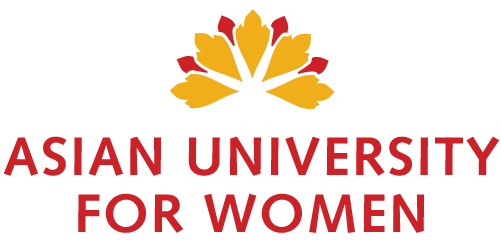Workshop with a Visiting USAID Team and Current MA in Education Students at AUW
Asian University for Women (AUW) is going to offer a fully-funded residential one-year In-service Master of Education (M.Ed.) program integrated with “Whole College Transformation Initiatives (WCTI)”. In this regard, AUW’s M.Ed. team and the current MA in Education students had a three-hour-long discussion with a visiting USAID team on 15 June 2022. The Director of the M.Ed. program, Dr. Selim Reza presented the problems in the intermediate college sector and AUW’s proposal for solving these problems through a high-quality teacher training program.
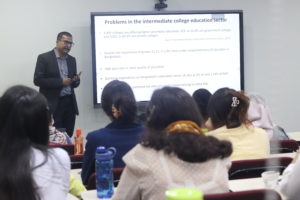
Dr. Selim Reza, the Director of In-service M.Ed. program is presenting on the problems of
Bangladesh’s intermediate college education sector
In his presentation, apart from the sector-based problems Dr. Reza talked about poor teacher-student ratios. In order to cover all the contents in syllabi, the college teachers are often given large classes to teach where lecture-based teaching is the most common practice. For the teachers, completing the targets outlined in syllabi becomes more important than following appropriate pedagogical methods for teaching effectively. As the class size tends to correlate with the quality of teaching significantly, it would be useful if we could find a way to address this based on the needs of the Bangladeshi context, as he argued. He also mentioned that the commonality of colleges that are doing great is that every person in those colleges is working towards that improvement: Principals, management, community members, and staff all are equally important.
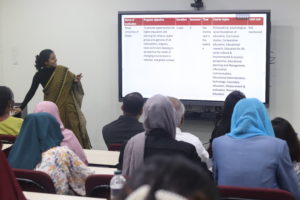
Ms. Sumaya Halim (Research Assistant, In-Service M.Ed.) is presenting the current
M.Ed. programs of Bangladesh
Ms. Sumaya Halim, a Research Assistant for AUW’s In-service M.Ed., continued the presentation by bringing up the existing M.Ed. programs in Bangladesh and their features. She described how the existing M.Ed. programs are mostly based on theoretical courses and thus practical training is neglected. Also, she presented her research findings and explained why the teacher training centers are struggling to ensure quality training due to inadequate resources.
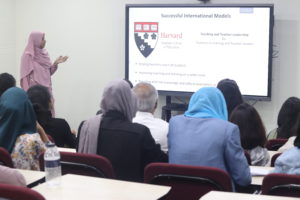
Ms. Nujhat Jahan (Research Assistant, In-Service M.Ed.) is presenting on successful international M.Ed. programs
Ms. Nujhat Jahan, a Research Assistant for AUW’s In-service M.Ed., then outlined the successful international M.Ed. program models. Her analysis explained the ideal scenario that includes learner-centered pedagogical approaches, research, and practical experience in urban and rural places. She elaborated on AUW’s plan of collaborating with globally-acclaimed M.Ed. programs. Through a partnership with the international curriculum and instruction programs, AUW will undertake a collaborative effort for training and capacity building of intermediate college teachers in a progressive pedagogy that will enable them to create an effective learning environment for their students in realistic classroom settings. Local education leaders and the whole college management will be integrated into such efforts.
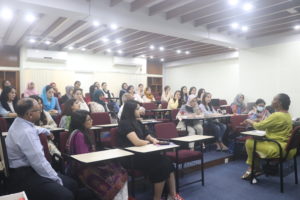
Dr. Sonjai Reynolds-Cooper, Chief, Office of Education and Youth at USAID is interacting with current MA students at AUW
After the presentation, Dr. Sonjai Reynolds-Cooper, Chief, Office of Education and Youth at USAID expressed her interest in the idea of engaging the whole community, especially in countries like Bangladesh. Nevertheless, she questioned taking out the teachers from the system for twelve months. This may result in some fractions that need to be taken care of from the beginning as she stated. She therefore emphasized on missed opportunities for the pre-service teachers. Following this discussion, Dr. Rubana Huq, Vice Chancellor of AUW proposed a change in the civil service exam to recruit genuinely passionate teachers and offer exclusive incentives to them so that the best people could compete for the teaching profession.
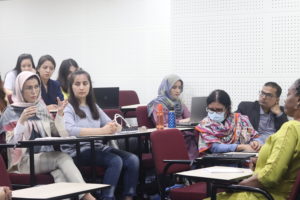
Current MA students at AUW are sharing their learning experience at AUW]
AUW’s current MA students from Afghanistan advocated keeping mental health support for college teachers as they might also face these problems due to high work pressure. However, Bangladeshi students argued to investigate more on the actual scenario of Bangladesh as some of the teachers do not go to colleges because they have their own private coaching centers and students come there. In some cases, teachers remain absent from teaching for a long period.
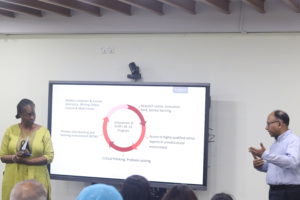
Mr. Ali Shahiduzzaman, Senior Education Specialist at USAID is discussing on the importance of teacher training
Mr. Ali Shahiduzzaman, Senior Education Specialist at USAID appreciated AUW’s detailed research and background work for launching an in-service M.Ed. program. He mentioned that at Bangladesh’s primary level some teachers have “training fatigue” due to frequent participation in training programs but still there has been very slight improvement in the primary education sector. This is because the real classroom settings are different. Realistic teacher training programs are really important to improve the teaching and learning quality, as he mentioned.
The USAID representatives further talked about having a poor monitoring and supervision system in higher secondary education sector. Also, in Bangladesh, the teachers training programs generally add no value to the teachers’ careers, not even a salary raise. These issues need to be addressed in AUW’s M.Ed. program, as they emphasized constructively.
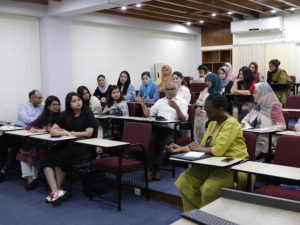
The Founder of AUW, Mr. Kamal Ahmad is elaborating on AUW’s vision for achieving high-quality education at intermediate college level
Finally, the Founder of AUW, Mr. Kamal Ahmad concluded that for AUW’s M.Ed. program to be successful and remarkable, AUW is planning to work with the mainstream education system with support from the government. To implement all the sub-elements of this M.Ed. program successfully, AUW plans to work with the District Commissioners (DCs), Ministry of Education (MoE), Directorate of Secondary & Higher Education (DSHE) and other government high officials. A monitoring and evaluation system will be developed to set AUW’s goals to see what we want to achieve within next 5 or 10 years. AUW wants to train people who are already within the system and with a little bit of training they can make a big difference, as he expressed his vision.
About the Author
Nujhat Jahan is a Research Assistant, In-Service Master of Education (M.Ed.) program at Asian University for Women
Photo Credit:
Nitu Akter, Student at Asian University for Women
Workshop with Intermediate College Teachers at Asian University for Women
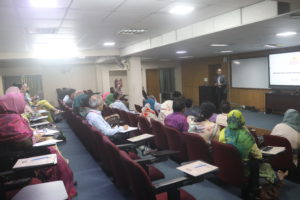
An information session for intermediate college teachers is being conducted at AUW by Dr. Selim Reza, Program Director, In-service M.Ed.
Asian University for Women (AUW) will soon be inaugurating a fully-funded residential, one-year, in-service Master of Education (M.Ed.) program for female intermediate college teachers to improve the quality of education as well as empower women in Bangladesh. To assess the need for such a high-impact teacher training program in the region, AUW invited college teachers and principals from Chittagong, Cox’s Bazar, Bandarban, Khagrachari, Rangamati and Noakhali to a workshop on 15 June, 2022.
Gathering twenty-six college teachers and principals within a tremendously tight schedule was feasible only because of the genuine enthusiasm college principals showed when contacted and the purpose of the workshop was explained. The workshop was arranged to hear those voices that often remain unheard. The teachers. It is upon them how generations shape. However, it is most unlikely that the policymakers note teachers voices properly and act accordingly, notwithstanding they know better than anyone else about what actually happens in classes when they deal with students. Instead of directly jumping into solving the multifaceted problems in the intermediate college education sector in Bangladesh, AUW wanted to learn from teachers for understanding the situation better and it created a platform for them to speak up through this workshop.
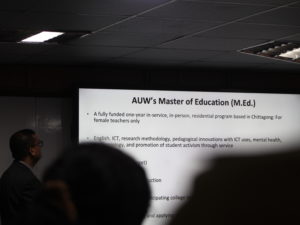
Dr. Selim Reza is explaining the core components of the M.Ed. Program.
A thorough discussion on the importance of teachers training was the main achievement of the workshop. While talking about the challenges of college teachers training in Bangladesh, principals and teachers, both male and female, expressed their concern over budget constraints, inadequate time to allow teachers for long-term training courses, the social barriers for female teachers, attitude and limitations of college management committees etc. The teachers, in this regard, shared ideas such as short-term training courses, evening courses, special courses prioritizing novice teachers to take up the training more and as such to address these issues.
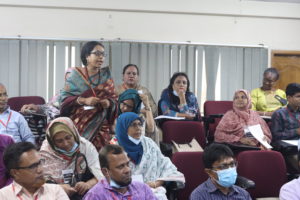
One of the female college teachers is highlighting the challenges she encounters as a teacher.
The workshop provided the teachers with some creative ideas and introduced a new opportunity for professional training for female teachers. Moreover, it created a network of college teachers coming from different parts of Chittagong. The interactions among teachers were spontaneous and contributed to some practical ideas to incorporate in the design and development of AUW’s inaugurating in-service M.Ed. program.
The two and a half hours long program was facilitated by Professor Dr. Selim Reza, Program Director, In-service Master of Education (M.Ed.) Program, Asian University for Women. Besides, the Founder of AUW Mr. Kamal Ahmad and Vice Chancellor of AUW Dr. Rubana Huq graced the event and shared their valuable thoughts on the importance and necessity of a high-quality teachers training program with the teachers.
About the Author
Sumaya Halim is a Research Assistant, In-Service Master of Education (M.Ed.) program at Asian University for Women
Photo Credit
Nitu Akter, Student at Asian University for Women
